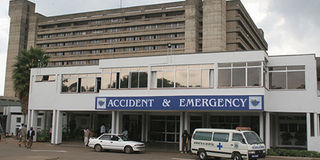Removing court cover will expose insurers to more risk

Street lawyers often chase ambulances carrying accident victims in search of clients. Photo/FILE
Motor insurance is caught-up in a web of competing interests, as fraudulent claims continue to bleed underwriters thin.
The Insurance Regulatory Authority has raised the redflag over the financial haemorrhage, as it faces the dilemma of protecting either customers or insurance companies, but still have a stable insurance industry.
“There’s is a lot of fraud in PSV, which is perpetrated by a cartel of crooks whose work is to milk the sector through non-existent or exaggerated claims,” IRA chief executive officer Sammy Makove said.
Companies underwriting motor vehicles that have folded in the past include Kenya National Assurance, Stallion, United, Lakestar, Liberty, Access and Standard Insurance. Invesco Assurance was revived early in the year after two years in the cold.
Competing interests in insurance business have come into play over the recent controversy raised by the move by insurers to seek conservatory orders to delay payment of claims so as to verify claims.
Industry sources say interests begin right after an accident is reported to the point of payment, with police and medical practitioners colluding to exaggerate the numbers of the injured and the dead.
“The occurrence book has become the starting point where most of the insurance companies death begins,” said Invesco Managing Director Geoffrey Njenga. Matatu owners have a stake in the company and that is hoped to stabilise to reduce fraud.
Insurance Regulatory Authority said it would appeal the orders, which expose PSV operators to huge liabilities, but noted that 40 per cent of the claims were not genuine. Fraud is higher in motor vehicle underwriting, where 50 per cent of the claims are either fake or exaggerated.
“This protection is necessary because prior to moratorium, 631 fraudulent claims were unearthed in a sample of 1,000. We are ready to prove our case when the attorney-general appeals against the orders” said Mr Njenga.
Invesco Assurance, Directline Insurance and Blueshield have recently been granted grace period by the courts ostensibly to be able to verify claims. But analysts say the rush for court protection was an indication that these companies are unable to settle all the claims in the short-run. “I suspect their cash flow is strained and require some time to be able to organise and pay the successful claims,” he said.
Without such protection, Mr Njenga said Invesco risked being overrun by agents of the fraudulent claimants. Mr Njenga said the names of the injured and the dead are exaggerated in the report made to the police, and most of the time insurance companies learn about the claims long after judgement is made.
Capped compensation
“The police collude with medical practitioners and lawyers, referred to as ambulance chasers, to fleece the companies through exaggerated and fictitious claims after they obtain orders,” he said.
Invesco Assurance is 80 per cent owned by the Matatu Owners Association, which is currently collecting data to curb fraud. Mr Njenga said data is collected immediately after the accident and filed with the company within 24 hours.
With limited capacity to monitor accidents most companies have become easy prey for the lawyers who act as ambulance chasers. The structured compensation scheme proposed in this year’s budget is expected to curb predatory actions have pushed many motor vehicle underwriting companies in the red.
“What this means is that the amount of compensation in any motor accident will be capped and defined injuries compensated in a prescribed manner,” said Mr Makove. The regulator will also set up an internal anti-fraud unit similar to that in banking.




